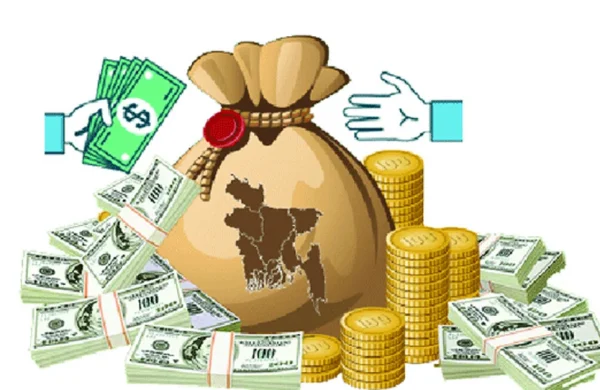Heavy burden of foreign debt
- Update Time : Thursday, December 12, 2024

TDS Desk
Bangladesh is grappling with a mounting foreign debt burden, which has surged by 282% over the 14 years of the Sheikh Hasina government.
When the Awami League assumed power following the December 2008 elections, the country’s foreign debt stood at $26.572 billion by the end of 2010. By the close of 2023, this figure had escalated to $101.447 billion. With repayments for large-scale infrastructure projects now underway, the amount of foreign debt being acquired is less than the amount being repaid.
According to sources from the Economic Relations Division, loans have been taken for several major projects, including the Padma Multipurpose Bridge, Dhaka Metro Rail, the third terminal of Dhaka Airport, the Dhaka Elevated Expressway, the Rooppur Nuke Plant, the Karnaphuli Tunnel, and the Matarbari Deep Sea Port project.
World Bank’s “International Debt Report 2024” reveals that foreign debt stood at $26.572 billion by the end of 2010. Over the past 14 years, the debt has surged by 282%, or $74.875 billion, reaching $101.447 billion by the end of 2023.
Long-term debt saw the largest increase, rising by 274%, from $22.222 billion in 2010 to $83.284 billion in 2023. Interest payments on long-term debt have also risen significantly, from $203 million in 2010 to $1.721 billion by the end of 2023.
Additionally, loans from the IMF have increased by 180%, from $1.402 billion in 2010 to $3.932 billion in 2023.
The report states that over the past 14 years, Bangladesh’s short-term foreign debt has increased both in terms of borrowing and repayments. In 2010, the country’s short-term foreign debt stood at $2.947 billion, but by the end of 2023, the debt balance had risen to $14.231 billion, reflecting a 382% increase in borrowing.
Similarly, interest payments on this short-term debt have surged from $203 million in 2010 to $1.721 billion by the end of 2023, marking a 747% rise in interest payments.
Overall, while foreign debt has increased, Bangladesh Bank’s data shows that foreign borrowing by the private sector has decreased by nearly 2% over the past six months. As of June this year, the private sector’s foreign debt stood at $20.57 billion, down from $20.95 billion at the end of December last year.
In October 2023, the private sector’s foreign debt had been $21.28 billion, but over the following nine months (up to June 2024), the private sector’s foreign debt decreased by $706 million. With the commencement of repayments for loans related to several mega projects, such as the Padma Rail Link, Metro Rail, and Karnaphuli Tunnel, the amount of foreign debt acquired is $280 million less than the amount that has been repaid.
According to a report from the Economic Relations Division, in the first quarter of the current fiscal year, Bangladesh repaid $112.65 million in foreign debt, including both principal and interest. While debt repayments have increased, disbursements from development partners have declined. Compared to the same period last year, disbursements fell by $435.6 million, totaling $846.1 million in the current quarter, down from $128.17 million.
Furthermore, new loan commitments have dropped by 99%. During this period, development partners committed just $27.4 million in new loans, a stark decrease from $28.8 billion in commitments made in the same quarter of the previous fiscal year.
Analysts say that while foreign debt has increased, the government must focus on enhancing its repayment capacity to ensure that the debt does not pose a risk.
Muinul Islam, former Professor of Economics at Chittagong University, said that Bangladesh’s foreign debt has surpassed $100 billion due to the implementation of mega projects. He expressed concern, noting that when these projects are completed, the revenue generated will only cover a very small portion of the loan repayments.
Dr Zahid Hussain, former Lead Economist at the World Bank’s Dhaka office, said that, in addition to the government, state-owned banks have also provided various loan guarantees. He further highlighted the involvement of state-owned loss-making enterprises in these guarantees. He warned that if these guaranteed loans are not repaid, it could pose a significant concern.














